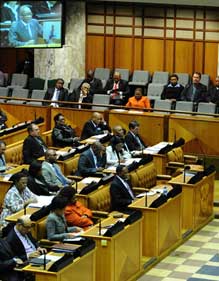
New Public Service and Administration Minister Collins Chabane appears to be confronting head-on his department’s task of transforming the public service into an "effective service delivery machine".
Last week, the Business Day reported that Chabane sees rooting out corruption as part of his department’s normal work. On this score, he highlights the importance of expedited disciplinary processes within the public service.
At Corruption Watch, we receive countless reports of public officials acting outside the bounds of the law. We are thus squarely in agreement with Chabane on the importance and urgency of fair, but swift, disciplinary processes. The Public Service Commission’s startling figures in 2011 — which put the cost of financial misconduct to the state at more than R900-million — are a stark reminder of this.
But Chabane will need a vehicle to give effect to expedited disciplinary processes in the public service. In thinking this through, we remind Chabane of the concept of an Anti-Corruption Bureau, introduced by his predecessor, but which never survived the legislative process.
The idea of such a bureau was introduced in the Public Administration Management Bill that was tabled for comment by Lindiwe Sisulu last year. Corruption Watch submitted detailed comments to the department on the bureau, as well as in Parliament, setting out why its powers were constitutionally supportable and how its formulation could be strengthened to achieve its objectives.
Unfortunately, the bill morphed significantly after its introduction. The version of the bill that now awaits presidential assent does not contain the provisions for establishing a bureau.
Despite this, it would be worth Chabane’s while to look at what the bureau set out to achieve and whether it can be salvaged. For example, it had far-reaching powers to investigate and institute disciplinary proceedings over corruption-related misconduct in the public service. It was empowered to facilitate the protection of whistle-blowers. Corruption Watch views this of paramount importance. It was also empowered to build capacity within institutions to conduct misconduct investigations and disciplinary hearings.
In our view, the proposed bureau would have gone a long way towards strengthening the capacity of the state to investigate alleged corrupt conduct by public officials and to institute disciplinary action. It would also assist in countering what Chabane describes as a "lack of action" against wrongdoers and the concomitant fuelling of perceptions of corruption in the public service.
The bureau was replaced by a "technical support unit" that does not have the key investigative powers that were conferred on the bureau.
Another great pity is that the bill no longer contains the introduction of a "cooling-off" period for public officials who wish to move from the public to the private sector. If this provision had made it onto the statute books, officials would have had to wait 12 months before moving to the private sector if the official had been directly involved in awarding contracts to the private entity in question.
Corruption Watch made submissions to the department and Parliament endorsing cooling-off periods and highlighting the possible rationale behind such a law — to protect state proprietary information, to limit the potential influence of the prospect of a lucrative private employment opportunity in public decisionmaking, as well as to prevent corruption and the appearance of corruption.
Although the bureau and "cooling-off" periods are not set to become law, the latest version of the law, which was passed by Parliament, does introduce a novel, positive development in our law. It creates a ban on public officials doing business with the state. In particular, it provides that a state employee may not conduct business with the state, or be a director of a public or private company conducting business with the state. This outright ban is an advance in our law. It responds directly to the auditor-general’s numerous findings on government tenders being awarded to state employees.
Again, however, once the president signs it into law, we are going to need the capacity to enforce this ban. We are also going to need to act swiftly to discipline those who ignore it. The reports that we receive from the public alleging corruption make it clear that laws alone are not enough. We need effective means to enforce our laws. The bureau would have been the ideal vehicle to do so.
• Whittaker is head of legal services and investigations at Corruption Watch.

